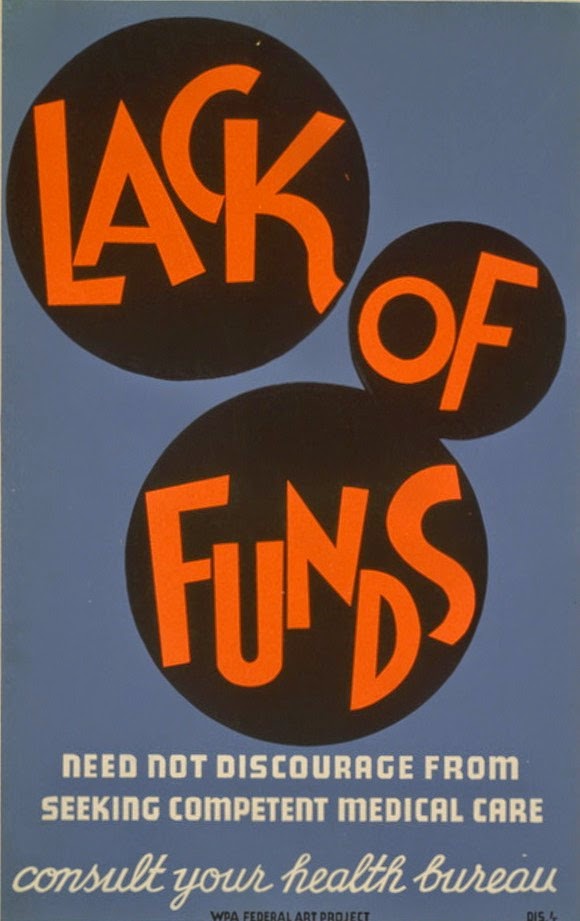(New Deal policy-makers felt that health care was important for everyone, including those of limited means. WPA poster--image courtesy of the Library of Congress Prints and Photographs Division.)
Former U.S. Secretary of Labor Robert Reich recently highlighted the fact that Republican-managed states "refused to expand Medicaid, even though the federal government will cover 100 percent of the cost for the first three years and at least 90 percent thereafter" and concluded "Right-wing ideology is trumping the health needs of millions of Americans. Let’s be perfectly clear: These policies are literally killing women."
Indeed, Republican policies on Medicaid expansion (i.e., refusing to expand it to cover more low-income Americans) are going to kill women and men. According to a study from Harvard Medical School and the City University of New York, it is likely that thousands of Americans will die due to the Republican refusal to expand Medicaid. Of course, we don't need a new study to know this is true (although additional evidence is always good). People without health insurance are less likely to get problems treated early, due to financial concerns, and these untreated problems often turn into long-term, serious problems. Also, Medicaid helps with the cost of prescription medicines. In any event, we already knew that a lack of health insurance increases a person's chance of dying (see, e.g., "Hospitalized children without insurance are more likely to die, a study finds" and "Uninsured more likely to die, study finds").
(New Deal policy-makers understood that treating problems early was essential for a healthy life. WPA poster--image courtesy of the Library of Congress Prints and Photographs Division.)
Americans for Prosperity, a group that has received funding from the right-wing billionaire Koch brothers, and is fighting against Medicaid expansion, states "Medicaid patients are almost twice as likely to die during surgery than individuals with private insurance. Medicaid expansion means that the folks who need the most help would get hurt the worst." But this statement ignores the basic, underlying problem: Low-income Americans cannot afford private health insurance unless it is provided by their employers, and many low-income Americans work at jobs where the employer does not offer it (and many other low-income Americans are unemployed, thanks to the white collar crime, financial gambling, fraud, greed, and corruption emanating out of Corporate America). To suggest that a particular option (Medicaid) is worse than an option that is not available (private health insurance) is both deceitful and ignorant. And, to feign interest in the well-being of low-income Americans, after all the decades that their health insurance needs have been neglected, is pathetic.
Former vice president Al Gore recently argued that Republican politicians deny that human activities play a role in global warming (despite a 97% level of agreement among climate scientists that humans are playing a role) because they are trying to curry "favor with Republican megadonors like Charles and David Koch." The same phenomenon is occurring with Medicaid expansion. Republican politicians who depend on the Kochs (as well as other right-wing millionaires and billionaires) for campaign cash are denying health insurance to low-income Americans to curry favor with their political sugar daddies. Their climate change denials, and their refusal to expand Medicaid, are ways of saying, "See, I'm a good right-winger. Support me with campaign money. If you do, I'll make sure regulations won't hinder your pollution-generating business, and I'll make sure that your taxes won't go up to help the poor."
Welcome to the Reverse New Deal: Denying medical coverage to low-income Americans, in return for campaign cash.
(New Deal policy-makers understood that health care is not only important to the individual, but also important for society as a whole (for example, consider the problem of communicable diseases). WPA poster--image courtesy of the Library of Congress Prints and Photographs Division.)



No comments:
Post a Comment